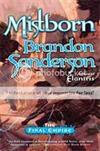
Taking the Red Pill: Science, Philosophy and Religion in The Matrix
1 journaler for this copy...
The subtitle of this book is "Science, Philosophy and Religion in The Matrix", which pretty much says it all: it's a collection of essays from various learned (and maybe some less-learned) authors explaining all the extra depths that they saw in the original Matrix. Some of it is pretty deep, other bits seemed like absolute b-s to me; but then, that may reflect my own interest / acceptance of some worldviews (e.g. religion) more than it does the authors' skill or expertise.
Two thing stood out for me in this: there are a couple of different essays in this book looking at the religious aspect and they all see The Matrix as a latter-day retelling of God's story. Which is all fine and good, apart from the fact these essays look at different religions; so Neo is Jesus Christ, but he is also Buddha. Does that mean you can find references to any religion in the film? Or that all religions are at their base the same? I've long been a proponent of the latter statement, so my interpretation seems pretty obvious...
The other thing that I noticed is how dated the book is now. Partly, it's clear that it was written after the original Matrix, but before the sequels. So when the book carries on (and on and on) about how Neo and Trinity never really make out and she isn't really a woman (harsh, that) - well, I can't help remember the second and third film, where some totally unnecessary sex-scenes were included.
But the book feels a lot more dated in two of the later essays, when Ray Kurzweil and Bill Joy gaze into their crystal balls to work out when real life will emulate The Matrix. Both see nanotechnology and genetic manipulation as technologies that will mature and take over the world within 10 - 20 years of their time (early noughties). For all that I think nanotech and genetics have lots of promise (or are scary as hell, if you follow Bill Joy's interpretation), we've clearly not made the progress in these fields that Kurzweil and Joy predicted a decade ago. On the other hand, they didn't see the smartphone / Facebook pervasive computing era coming. I know it's unfair to judge their predictions with hindsight (although Kurzweil asks for it, after tooting his own horn about his uncanny skill at second-guessing the future) and I don't mean to belittle their efforts. It just shows how much has changed in the last years: we've had paradigm-shifts in fields that nobody realised had a paradigm to start with!
Is this a good book? I don't know really. While reading it, I was mainly annoyed with people taking the film so unbelievably serious. But then - looking back at my own comments, it clearly set me thinking. And maybe that's just what all these authors did too: use The Matrix simply as an excuse to think about the world. If hooking up your philosophy to a popular film helps to get people thinking about it, then that's worthwhile, isn't it? The fact that I disagreed with almost everyone in the book is neither here nor there: you can't disagree with someone until you've at least started listening to them.
So it is thought-provoking, if not necessarily how I think the editor meant it. And it was probably worth reading it. But I don't think I will feel the need to read it again. I think this is one that I'll set free. If it can provoke thoughts in someone else (maybe someone who will enjoy this book more than I did), it'll be doing its job. It'll have to be a wild release the next time I go for a cinema.
Two thing stood out for me in this: there are a couple of different essays in this book looking at the religious aspect and they all see The Matrix as a latter-day retelling of God's story. Which is all fine and good, apart from the fact these essays look at different religions; so Neo is Jesus Christ, but he is also Buddha. Does that mean you can find references to any religion in the film? Or that all religions are at their base the same? I've long been a proponent of the latter statement, so my interpretation seems pretty obvious...
The other thing that I noticed is how dated the book is now. Partly, it's clear that it was written after the original Matrix, but before the sequels. So when the book carries on (and on and on) about how Neo and Trinity never really make out and she isn't really a woman (harsh, that) - well, I can't help remember the second and third film, where some totally unnecessary sex-scenes were included.
But the book feels a lot more dated in two of the later essays, when Ray Kurzweil and Bill Joy gaze into their crystal balls to work out when real life will emulate The Matrix. Both see nanotechnology and genetic manipulation as technologies that will mature and take over the world within 10 - 20 years of their time (early noughties). For all that I think nanotech and genetics have lots of promise (or are scary as hell, if you follow Bill Joy's interpretation), we've clearly not made the progress in these fields that Kurzweil and Joy predicted a decade ago. On the other hand, they didn't see the smartphone / Facebook pervasive computing era coming. I know it's unfair to judge their predictions with hindsight (although Kurzweil asks for it, after tooting his own horn about his uncanny skill at second-guessing the future) and I don't mean to belittle their efforts. It just shows how much has changed in the last years: we've had paradigm-shifts in fields that nobody realised had a paradigm to start with!
Is this a good book? I don't know really. While reading it, I was mainly annoyed with people taking the film so unbelievably serious. But then - looking back at my own comments, it clearly set me thinking. And maybe that's just what all these authors did too: use The Matrix simply as an excuse to think about the world. If hooking up your philosophy to a popular film helps to get people thinking about it, then that's worthwhile, isn't it? The fact that I disagreed with almost everyone in the book is neither here nor there: you can't disagree with someone until you've at least started listening to them.
So it is thought-provoking, if not necessarily how I think the editor meant it. And it was probably worth reading it. But I don't think I will feel the need to read it again. I think this is one that I'll set free. If it can provoke thoughts in someone else (maybe someone who will enjoy this book more than I did), it'll be doing its job. It'll have to be a wild release the next time I go for a cinema.










